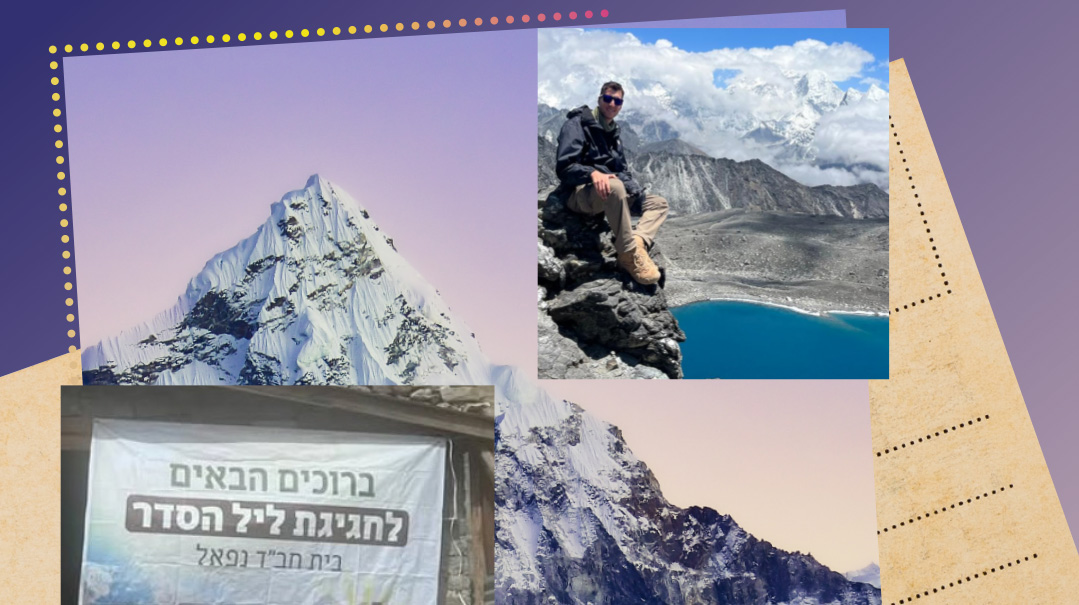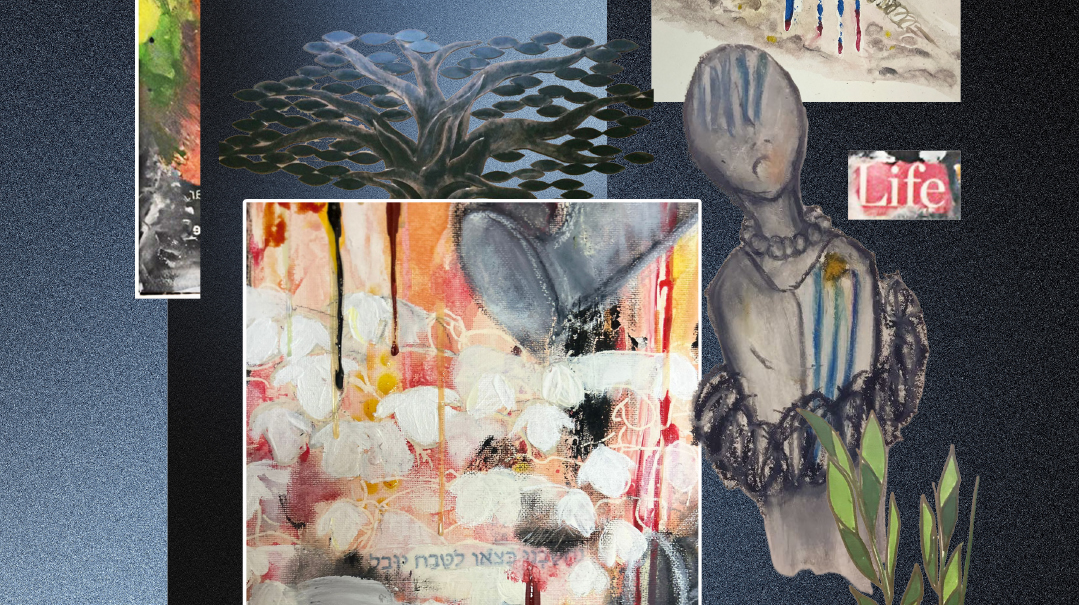Home Away from Home
| May 20, 2025Meet Chani Lifshitz, the Chabad shluchah in Kathmandu, Nepal

Photo Credit: Chabad Nepal and Itai Elmaliach
B
etween narrow and crowded streets in the heart of Kathmandu, Nepal’s capital, is a Chabad House — a Jewish oasis amid a sea of Buddhist and Hindu structures. Chani Lifshitz and her husband, Chezi, have been the shluchim here for 24 years. “We arrived here as a young couple with a ten-month-old baby,” Chani says. “I was twenty-two and my husband Chezi was twenty-five.” Spiritually, everything around us was a barren wilderness.” (Today, Chani is a mother to six children aged nine to twenty-five, bli ayin hara.)
Unlike in many places around the world, there’s no permanent Jewish community in Kathmandu. Instead, around 25,000 Jewish backpackers pass through annually, most of them Israelis after their military service. “We built everything here with our own hands,” Chani says. “With a vision to provide a Jewish home for every backpacker, we started with a minyan and shiurim, and eventually established a private school for our children with teachers from Israel.”
“We live in an exotic, mountainous place somewhere between India and China. A large part of Nepal’s territory is made up of the Himalayas, which includes Mount Everest,” Chani explains. Young backpackers from all backgrounds and sectors of Israeli society arrive at the Lifshitz home, searching not only for the world’s tallest peak, but also for themselves.
“The backpackers fill our house every day, all day long,” Chani says with a smile, “and we’re here for them for whatever they need.”
(Originally featured in Family First, Issue 944)
Shlichus in the Himalayas
“We never know what the day will look like when we wake up,” says Chani with a mix of seriousness and humor. “We juggle many roles: parents, older siblings, psychologists, rabbi and rebbetzin, Torah teachers, ‘mom and dad’ to all the backpackers in the area. A typical day could begin with helping a traveler put on tefillin for the first time, continue with an emergency rescue by helicopter from the peaks of the Himalayas, and end with a hospital visit or emotional support for a traveler in crisis.”
Over the years, the extreme natural events in Nepal posed dramatic challenges. In 2014, during a catastrophic snowstorm, and a year later, during a devastating earthquake, the Chabad House became an emergency center. “We did everything we could to assist anyone in trouble,” Chani recalls humbly.
Feeding all those who pass through their Chabad house is a huge logistical challenge. Chani manages two restaurants — a milchig and a fleishig one — and oversees a team of ten Nepali employees, along with Israeli volunteers, who prepare meals for hundreds of guests.
The peak of activity is Yom Tov time. “Over the years, I learned to delegate,” says Chani. “Everyone pitches in: the local team, the backpackers, the volunteers. Together, we bring the magic of Yom Tov to the Middle of Nowhere.”
“When we first came to Nepal, we had a small kitchen. As the number of guests grew, so did the size of our kitchen. At the Pesach Seder, we can have as many as two thousand people. That’s why I employed chefs to help me prepare the food. Our meat is imported from Israel. We can’t shecht locally because the Nepalis believe the cow is sacred. But they allow us to milk them. On Fridays, my husband brings a cow to the yard, and we milk it, getting about forty liters of milk that lasts us for the week. We then pasteurize the milk in large pots. The backpackers help us with this task, too. We make cheeses and other dishes for the dairy restaurant from the milk.”
Balancing Multiple Roles
“There’s no doubt the challenge of living here isn’t simple. We live in a primitive place with severe poverty and street children lying in the streets, where the homes sometimes have no running water or electricity. It feels like traveling back in time by hundreds of years,” Chani says. “But the biggest challenge is remembering that before everything, I’m a wife and a mother. This is my essence.”
She learned important lessons during the first years of shlichus. “Like many mothers around the world, I made mistakes. But I quickly realized that we had to protect the children from exposure to all the dramas that come our way. We love hosting, but we always try to remember that first and foremost, we’re parents to our children.”
Chani explains that they’ve created a private floor for their children in their home, where visitors don’t often go. “You won’t find my children getting shoulder rides from the backpackers,” she says. “They choose who to let into their lives. In a place with so little privacy, it’s important we respect their space.”
Naturally, as Chani’s children grew, they were sent away for school. “Three of my children learn in Israel, and there’s no doubt that missing home is very challenging for them. Baruch Hashem, despite the fact that most of the visitors to our home aren’t yet frum, our children turned out well, dedicated to Torah and mitzvos.”
Chani and her husband have another shlichus — raising their special-needs daughter, Chali. Chani recalls the days when they learned that their second child was on the autism spectrum. “Very quickly, I realized she was different,” says Chani.
“Because I’d worked with children with special needs, I knew I had to invest in Chali’s development and not wait around for diagnoses. I hired speech and occupational therapists and gave my heart and soul to her enrichment.
“Initially, we didn’t share Chali’s diagnosis with the public. Only after her bas mitzvah did I feel that I could share it with others. I felt I had a shlichus within a shlichus: To introduce Chali to the world and prove that it’s possible, against all odds, for children with special needs to blossom and achieve. If we believe in them, the sky’s the limit.”
Words of Wisdom
The Pintele Yid
Every Jew has a spark, the pintele Yid, in him, which doesn’t go out. It doesn’t matter where he is in the world or what path he’s chosen. There’s something that wakes up every Jewish soul when it’s in a state of need or longing. People want warmth, and if you offer it with love, that lights up the spark.
The Simple Moments
One small word can spark a major change in someone. The simplest moments — a conversation over a cup of tea or a shared silence — are the ones that create the really big changes.
A Listening Ear
Sometimes, a greater gift than talking is simply to be a listening ear. Listening allows others to hear themselves, and for you to understand their pain and connect to their truth.
Without Judgment
Everyone you meet is unique. Try to see them as they are, without judgment.
Learn from All
Learn from everything and everyone — from your failures, from your successes, and from the people you don’t always agree with.
Fill Yourself Up
Before you give to others, give yourself time to rest, think, and fill up. It’s not a luxury — it’s essential.
Internal Growth
Shlichus isn’t only about external action; it’s also about internal growth. You don’t just make an impact on others — you change yourself.
(Originally featured in Family First, Issue 944)
Oops! We could not locate your form.







